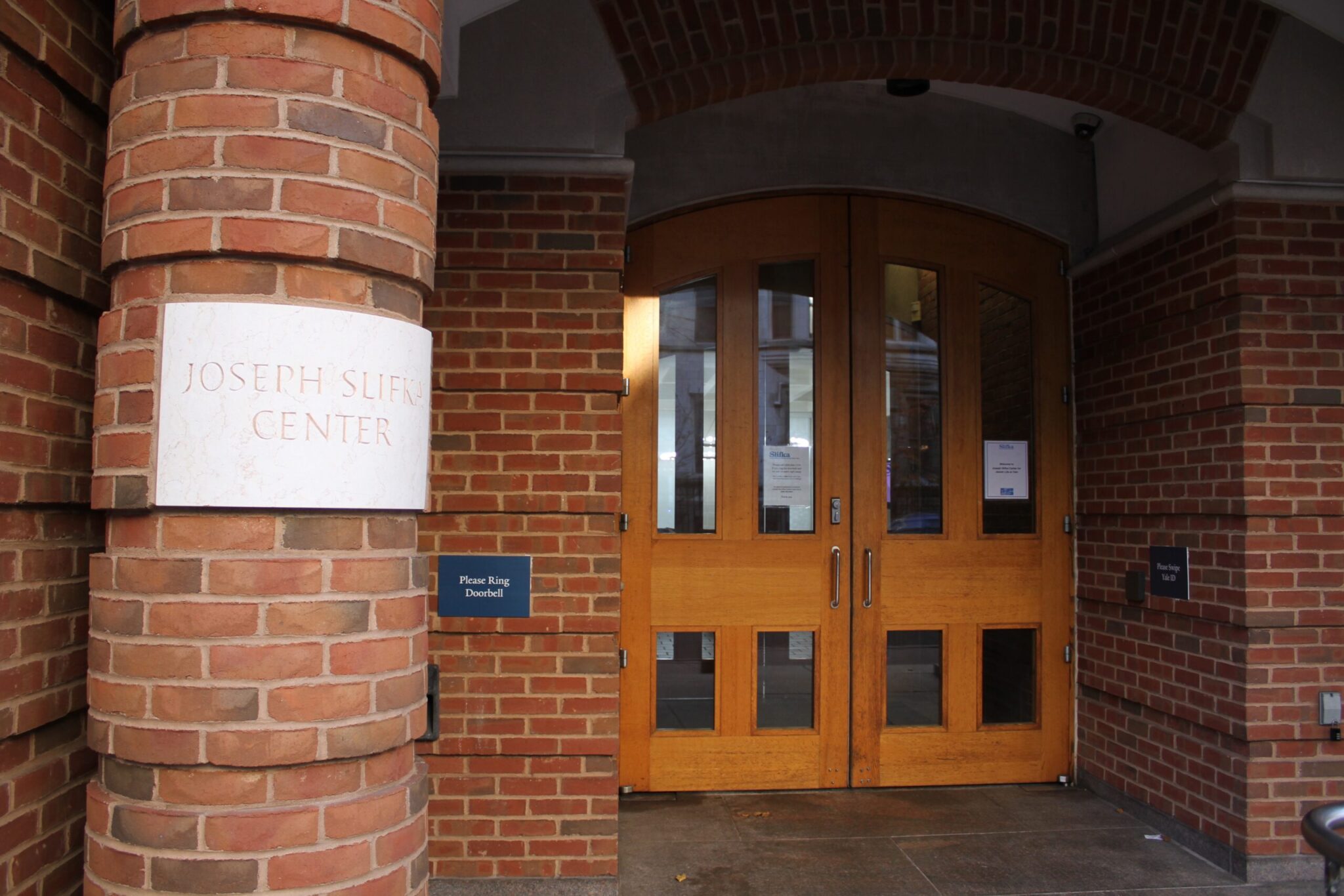A year of the Nigun Circle at Yale
Started last fall, the Nigun Circle is providing an informal and spiritual musical experience for Yale students.

Skakel McCooey, Senior Photographer
Started by two friends who met in Yiddish class, Yale’s Nigun Circle just celebrated its first year.
Nigun means “melody” in Hebrew and consists of wordless melodies that are traditionally sung by Hasidic Jews. Medad Lytton ’25 and Ruthie Weinbaum ’25 have been leading the group in song every Monday night since they had the idea to create the group last year.
“During Sukkot last year, on Friday night, Medad waved me over and said ‘Ruthie, I want to start a Nigun Circle [at Yale], do you want to start it with me?’” Weinbaum explained.
Lytton added that he was inspired to start the Nigun Circle after learning how to sing Nigunim during his gap years in Israel and developing an interest in Hasidic Judaism.
Lytton said that after learning more, he wanted to bring the power of Nigunim to students at Yale.
“The study of Yiddish is fundamentally about Jewish renewal and it sits at the crossroads between new-age progressive Jewish renewal and Hasidic Jewish renewal and the Nigunim also sit at that crossroads,” Lytton said.
Hasidic Judaism is a revivalist movement that began in 18th-century Eastern Europe and focuses on spirituality and connection with God through ecstatic or spontaneous prayer.
Although Lytton said that Hasidic Judaism is ultra-Orthodox, Lytton noted that the nigun has been picked up as “an important piece of Jewish renewal movements also in non-ultra-Orthodox spaces.”
Gryffin Wilkens-Plumley ’26, a frequent Nigun Circle attendee, spoke about the comfort of singing Nigunim every week.
“There’s things you can’t express, there’s things that you don’t know that need to be expressed that sort of are revealed through the process of the nigun,” Plumley said, adding that he had just been humming a nigun to comfort himself after a long day.
Lytton echoed Plumley’s statement, saying that the wordless quality of the songs act as a “container” for all individuals and emotions involved.
Those who attend the Nigun Circle with Lytton and Weinbaum come once a week to sit in a circle in the dark and sing the wordless melodies for about an hour.
“I always want Jewish spaces to have a lot of singing,” added Weinbaum, who sings in the Yale Glee Club and is currently the pitch of the a cappella group Red, Hot and Blue. “There is no sheet music, the only thing we plan is which songs we’re gonna sing. We don’t plan what key we’ll be singing in. We have no idea who is going to show up every week. It’s so different from singing in a choir and that feels in some ways more spiritual and more community-based.”
Lytton is also involved in singing at Yale, most recently with the Camerata at the Institute of Sacred Music, which is a joint program between the Divinity School and the School of Music.
He said that, for him, the Nigun Circle serves a dual role that sets it apart both from traditional musical groups and modes of worship on campus.
“Nigun Circle is part singing group and also part spiritual community,” he said. “Nigunim are my vision of how we can connect with the divine and become better people.”
As opposed to traditional Jewish prayer, Nigunim are more “spontaneous and fluid,” said Wilkes-Plumley.
Wilkes-Plumley described the worship as both “spiritual” and “easily accessible.”
“It’s more accessible than climbing to the top of a mountain and sitting there for several hours,” Wilkes-Plumley said. “I’m connecting to the other people but especially when I’m closing my eyes I’m trying to recenter myself and connect back to myself. I kind of try to obviate myself in the universe, to just stop thinking about myself as a separate thing and instead not think about myself.”
Other groups such as Taize, a group run by the Lutheran Ministry invite Yalies to engage in musical worship.
Taize convenes at Battell Chapel once a week to worship the divine in song.
“There are some songs with words and some without but they tend to be very simple, often two-line melodies that people harmonize over and repeat,” Lukas Bacho ’25 who has attended Taize, told the News.
Wilkes-Plumley said that he would be interested in attending an “interfaith Nigun” in the future.
Wilkes-Plumley said that since the beginning of the war between Israel and Hamas, the Nigun Circle has served as a respite to bring people together and a place to process pain for many in the community.
Wilkes-Plumley pointed to a particular Nigun Circle after a vigil on Oct. 9 at the Women’s Table, which he found especially meaningful.
“I remember after the vigil, I went up to the Nigun Circle and I’ll remember that for a long, long time. A long, long time,” Wilkes-Plumley reflected. “That Nigun Circle was very different. It was extremely potent, extremely heightened, and extremely needed.”
Lytton and Weinbaum spoke about the transformative power the Circle has had for them in times of need, with Lytton saying that people leave the singing session “transformed.”
Lytton and Weinbaum said that Nigun Circle is open to anyone of any religion or no religion as a space to wind down, meditate or process.
“Nigunim are about losing yourself in something bigger,” said Lytton.
Nigun Circle occurs every Monday night at 9:15 p.m. on the third floor of the Joseph Slifka Center for Jewish Life at Yale.







